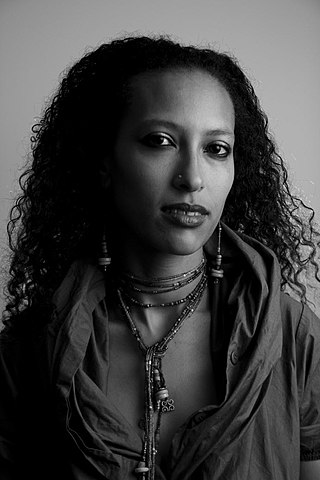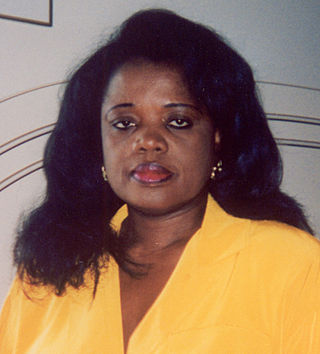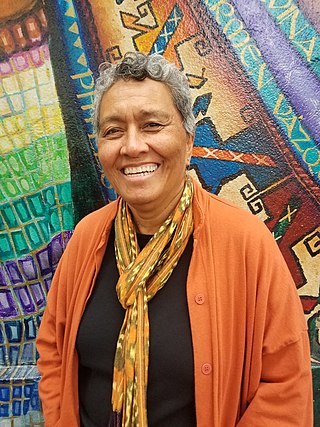Feminism is a range of socio-political movements and ideologies that aim to define and establish the political, economic, personal, and social equality of the sexes. Feminism holds the position that societies prioritize the male point of view and that women are treated unjustly in these societies. Efforts to change this include fighting against gender stereotypes and improving educational, professional, and interpersonal opportunities and outcomes for women.
Hazel Vivian Carby is Professor Emerita of African American Studies and of American Studies. She served as Charles C & Dorathea S Dilley Professor of African American Studies & American Studies at Yale University.
Postmodern feminism is a mix of post-structuralism, postmodernism, and French feminism. The goal of postmodern feminism is to destabilize the patriarchal norms entrenched in society that have led to gender inequality. Postmodern feminists seek to accomplish this goal through rejecting essentialism, philosophy, and universal truths in favor of embracing the differences that exist amongst women to demonstrate that not all women are the same. These ideologies are rejected by postmodern feminists because they believe if a universal truth is applied to all woman of society, it minimizes individual experience, hence they warn women to be aware of ideas displayed as the norm in society since it may stem from masculine notions of how women should be portrayed.

Feminist sociology is an interdisciplinary exploration of gender and power throughout society. Here, it uses conflict theory and theoretical perspectives to observe gender in its relation to power, both at the level of face-to-face interaction and reflexivity within social structures at large. Focuses include sexual orientation, race, economic status, and nationality.
Islamic feminism is a form of feminism concerned with the role of women in Islam. It aims for the full equality of all Muslims, regardless of gender, in public and private life. Islamic feminists advocate women's rights, gender equality, and social justice grounded in an Islamic framework. Although rooted in Islam, the movement's pioneers have also utilized secular, Western, or otherwise non-Muslim feminist discourses, and have recognized the role of Islamic feminism as part of an integrated global feminist movement.

Signs: Journal of Women in Culture and Society is a peer-reviewed feminist academic journal. It was established in 1975 by Jean W. Sacks, Head of the Journals Division, with Catharine R. Stimpson as its first editor in Chief, and is published quarterly by the University of Chicago Press. Signs publishes essays examining the lives of women, men, and non-binary people around the globe from both historical and contemporary perspectives, as well as theoretical and critical articles addressing processes of gendering, sexualization, and racialization.

Amina Mama is a Nigerian-British writer, feminist and academic. Her main areas of focus have been post-colonial, militarist and gender issues. She has lived in Africa, Europe, and North America, and worked to build relationships between feminist intellectuals across the globe.

Iris Marion Young was an American political theorist and socialist feminist who focused on the nature of justice and social difference. She served as Professor of Political Science at the University of Chicago and was affiliated with the Center for Gender Studies and the Human Rights program there. Her research covered contemporary political theory, feminist social theory, and normative analysis of public policy. She believed in the importance of political activism and encouraged her students to involve themselves in their communities.
E. Frances White is an American historian, author and academic serving as Professor Emerita of History and Black Studies at Gallatin School of Individualized Study. From 2005 to 2008 she served as Vice Provost of Faculty Affairs at New York University. Prior to that post, she was the Dean of New York University's Gallatin School of Individualized Study (1998–2005).
African feminism is a type of feminism innovated by African women that specifically addresses the conditions and needs of continental African women. African feminism includes many strains of its own, including Motherism, Femalism, Snail-sense Feminism, Womanism/women palavering, Nego-feminism, and African Womanism. Because Africa is not a monolith, these feminisms are not all reflective of the experiences African women have. Some of the feminisms are more specific to certain groups of African women. African feminism is sometimes aligned with, in dialogue or in conflict with, Black Feminism or African womanism as well as other feminisms and feminist movements, including nationally based ones, such as feminism in Sweden, feminism in India, feminism in Mexico, feminism in Japan, feminism in Germany, feminism in South Africa, and so on.

The African Gender Institute (AGI) is a feminist research and teaching group that studies issues related to gender in Africa. It has become a department at the University of Cape Town (UCT), administered within the School of African and Gender Studies, Social Anthropology and Linguistics. The AGI has its own dedicated staff and has a unique degree of independence from UCT.
Agenda is an African peer-reviewed academic journal of feminism, which was established in 1987 as a volunteer project in South Africa and is published by UNISA Press in collaboration with Routledge. In addition to publishing articles and other entries, the journal tutors young writers and since 2002 has a radio show, Turning Up the Volume on Gender Equity. Since 1991 it publishes four issues per year.
Gayatri Gopinath is an associate professor of Social and Cultural Analysis and director of the Center for the Study of Gender and Sexuality at New York University. Gopinath is perhaps best known for her book Impossible Desires: Queer Diasporas and South Asian Public Cultures, which received article-length reviews in a number of journals.
Jigna Desai is a Professor in the Department of Gender, Women and Sexuality Studies and Asian American Studies, currently at the University of Minnesota. She is a writer, teacher, mentor, artist, and engaged researcher whose scholarship crosses many fields of study including transnational feminism, Asian American Studies, queer studies, postcolonial feminism, critical disability studies, critical youth studies, feminist media studies, critical ethnic studies, and critical university studies. She has also written extensively on issues of racial and gender disparities and social justice.

Jessica Horn is a Ugandan feminist activist, writer, poet, and technical advisor on women's rights Her work focuses on women's rights, bodily autonomy and freedom from violence, and African feminist movement building. She was named as an African woman changemaker by ARISE Magazine and as one of Applause Africa's "40 African Changemakers under 40". She joined the African Women's Development Fund as director of programmes in October 2015.

Obioma Nnaemeka is a Nigerian-American academic. She is the Chancellor’s Professor of French at Indiana University–Purdue University Indianapolis.
White feminism is a term which is used to describe expressions of feminism which are perceived as focusing on white women but are perceived as failing to address the existence of distinct forms of oppression faced by ethnic minority women and women lacking other privileges. The term has been used to label and criticize theories that are perceived as focusing solely on gender-based inequality. Primarily used as a derogatory label, "white feminism" is typically used to reproach a perceived failure to acknowledge and integrate the intersection of other identity attributes into a broader movement which struggles for equality on more than one front. In white feminism, the oppression of women is analyzed through a single-axis framework, consequently erasing the identity and experiences of ethnic minority women the space. The term has also been used to refer to feminist theories perceived to focus more specifically on the experience of white, cisgender, heterosexual, able-bodied women, and in which the experiences of women without these characteristics are excluded or marginalized. This criticism has predominantly been leveled against the first waves of feminism which were seen as centered around the empowerment of white middle-class women in Western societies.

Feminist rhetoric emphasizes the narratives of all demographics, including women and other marginalized groups, into the consideration or practice of rhetoric. Feminist rhetoric does not focus exclusively on the rhetoric of women or feminists, but instead prioritizes the feminist principles of inclusivity, community, and equality over the classic, patriarchal model of persuasion that ultimately separates people from their own experience. Seen as the act of producing or the study of feminist discourses, feminist rhetoric emphasizes and supports the lived experiences and histories of all human beings in all manner of experiences. It also redefines traditional delivery sites to include non-traditional locations such as demonstrations, letter writing, and digital processes, and alternative practices such as rhetorical listening and productive silence. According to author and rhetorical feminist Cheryl Glenn in her book Rhetorical Feminism and This Thing Called Hope (2018), "rhetorical feminism is a set of tactics that multiplies rhetorical opportunities in terms of who counts as a rhetor, who can inhabit an audience, and what those audiences can do." Rhetorical feminism is a strategy that counters traditional forms of rhetoric, favoring dialogue over monologue and seeking to redefine the way audiences view rhetorical appeals.

Margo Okazawa-Rey, is an American professor emerita, educator, writer, and social justice activist, who is most known as a founding member of the Combahee River Collective, and for her transnational feminist advocacy.

Amina Doherty is a Nigerian/Antiguan feminist, artist and women's rights advocate. As an African-Caribbean feminist and women's rights advocate, her work is centered around raising awareness for social justice through movement-building, and innovative approaches to philanthropy and grantmaking. Amina's work takes many forms: art exhibitions, community programs, cultural events, philanthropic advising, and grantmaking initiatives.










